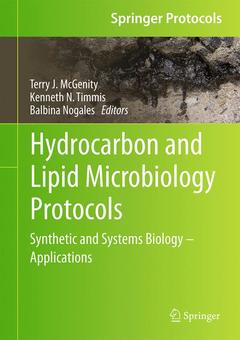Description
Hydrocarbon and Lipid Microbiology Protocols, Softcover reprint of the original 1st ed. 2016
Synthetic and Systems Biology - Applications
Springer Protocols Handbooks Series
Language: English
Subjects for Hydrocarbon and Lipid Microbiology Protocols:
Hydrocarbon and Lipid Microbiology Protocols
Publication date: 08-2016
Support: Print on demand
Publication date: 08-2016
Support: Print on demand
Hydrocarbon and Lipid Microbiology Protocols
Publication date: 06-2018
Support: Print on demand
Publication date: 06-2018
Support: Print on demand
Description
/li>Contents
/li>Comment
/li>
This Volume presents protocols for systems and synthetic biology applications in the field of hydrocarbon and lipid microbiology. It complements another Volume that describes generic protocols for wet experimental and computer-based systems and synthetic biology studies. The protocols in this Volume demonstrate how to employ systems and synthetic biology approaches in the design of microbes for the production of esters, isoprenoids, hydrophobic polymers, rhamnolipid biosurfactant, and peptide antimicrobial and thioether-stabilised molecules. Also presented is a protocol for the engineering of transcription factor-based biosensors for intracellular products, and another for the creation of a synthetic hydroxylase with novel activity for the selective oxyfunctionalisation of linear alkanes.
Hydrocarbon and Lipid Microbiology Protocols
There are tens of thousands of structurally different hydrocarbons, hydrocarbon derivativesand lipids, and a wide array of these molecules are required for cells to function. The global hydrocarbon cycle, which is largely driven by microorganisms, has a major impact on our environment and climate. Microbes are responsible for cleaning up the environmental pollution caused by the exploitation of hydrocarbon reservoirs and will also be pivotal in reducing our reliance on fossil fuels by providing biofuels, plastics and industrial chemicals. Gaining an understanding of the relevant functions of the wide range of microbes that produce, consume and modify hydrocarbons and related compounds will be key to responding to these challenges. This comprehensive collection of current and emerging protocols will facilitate acquisition of this understanding and exploitation of useful activities of such microbes.
Introduction.- Designing bacteria to produce esters.- Protocols for the production and analysis of isoprenoids in bacteria and yeast.- Synthetic biology of hydrophobic polymer production.- Methods for recombinant rhamnolipid production.- Purification of peptide antimicrobials and thioether stabilized molecules produced in vivo by lantibiotic modification machineries.- Engineering transcription factor based biosensors for the detection of intracellular products.- Oxyfunctionalization of linear alkanes with a biosynthetic, self-sufficient, selective and soluble hydroxylase.
Offers readily-reproducible step-by-step laboratory methods Provides helpful tips and tricks supporting the protocols Includes troubleshooting advice Contains practical laboratory guidance to promote successful results
© 2024 LAVOISIER S.A.S.




